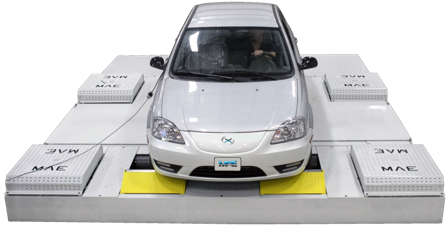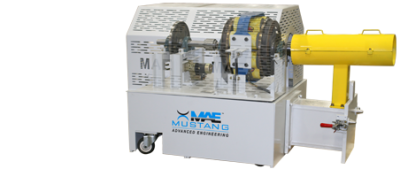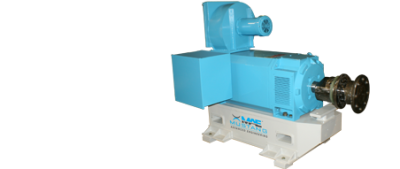Or “Dyno” for Short.
Introduction to Dynamometer Testing

A Dynamometer, or “dyno” for short, is any sort of device that measures force, torque or power. For chassis or engine applications, a dynamometer is designed to create a load to duplicate various speed (RPM) and torque (Nm or lb-ft) requirements. From this data, power (HP or kW) can be calculated. This in turn provides a snapshot of the chassis or engine performance for comparison to the manufacturer’s specifications. Typically, a dynamometer gives the operator the ability to vary the load applied to the unit under test to mimic specific requirements.
In chassis dynamometer applications the entire drivetrain can be tested simultaneously. The vehicle is anchored to the floor and the drive wheels are placed on rollers. A chassis dynamometer:
- Tests every rotating portion of the drivetrain
- Confirms the power and torque provided by the engine
- Can aid in the evaluation of performance as well as noise or safety issues
- Can simulate a real world application of the equipment
- Another major benefit to chassis dyno testing is the potential elimination of road testing. Road testing takes time and can incur costs if a breakdown or accident occurs. Chassis dynamometers typically create loads using an eddy current (EC) or water brake load device. You’ll read more below on EC and water brake design.
types of Dynamometers
Classified by absorption Unit / Method of creating “load”, The different types of Dynos are:
Eddy Current

An electrically controlled, air-cooled brake, the EC creates load by inducing a magnetic field in a rotating disc. The rotating disc produces heat that is dissipated in air or with water. Power Test uses EC brakes for absorption in lower power applications and makes engine dynamometers rated up to 250 HP. We also use EC brakes on a large range of chassis dynamometers for vehicle testing.
AC Motor (Alternating Current) or Regenerative

AC dynamometers create a load and can return power to the electrical grid through variable frequency regenerative power electronics. Where permitted, the operator of an AC dynamometer can receive payment (or credit) from the utility for the returned power. These dynos allow for fast transient testing with the ability to simulate the forces on an engine while a vehicle is rolling downhill or control the transient test patterns in emissions test cycles. AC regenerative technology is used on engine dynamometers ranging from 10 HP to 5,000 HP, as well as chassis dynamometers requiring transient or road-load control.
Water Brake
Water momentum transfer is used to create a load on the engine or vehicle being tested with the absorbed power heating water. Water brake dynamometers are ideal for higher power engine dynamometers with options ranging from 350 to 10,000 HP. These dynos are the most cost effective technology for larger internal combustion engines and electric motors.
Why Use a Dynamometer for testing?
Is it necessary to test with a Dynamometer versus something else?
testing with a Dyne is essential to a manufacturer, a Developer or service technician, because:
- Address engine performance and durability before installation
- Conduct a controlled break-in of a newly rebuilt engine
- Identify a problem without risking a breakdown on the road
- Test a vehicle without the need for a Commercial Driver License
- Reduce warranty or return for service after a rebuild or repair
- Dyno testing also is essential if you are purchasing new or used equipment and want to confirm:
Benefits of Owning a Dynamometer
Like any outsourced service, you need to account for the facility’s availability, pricing, and level of expertise in your work order or production schedule. With an in-house dynamometer, you have full control over the quality and expediency of testing. By doing so, you instill confidence in your customers that you have taken steps to ensure they receive the best possible product.
If you are consistently testing, the dynamometer will pay for itself before becoming its own revenue generator for your business.
Contact Mustang Advanced Engineering today about how we can help you determine What MAE Product or Service is right for you.
